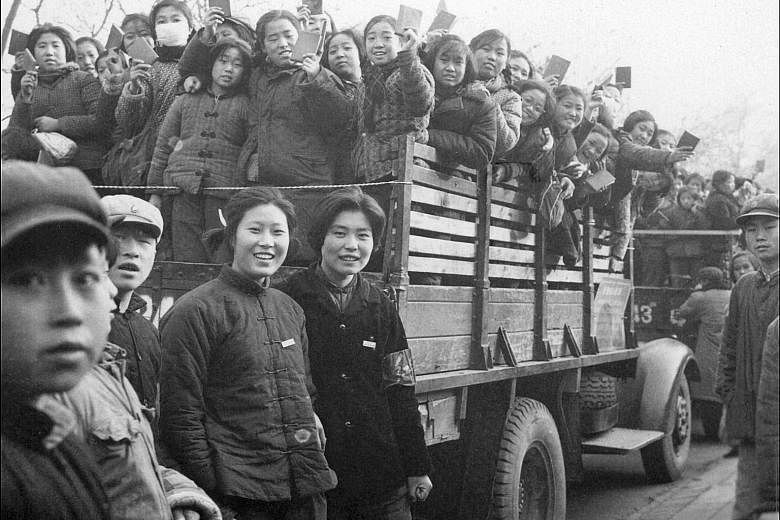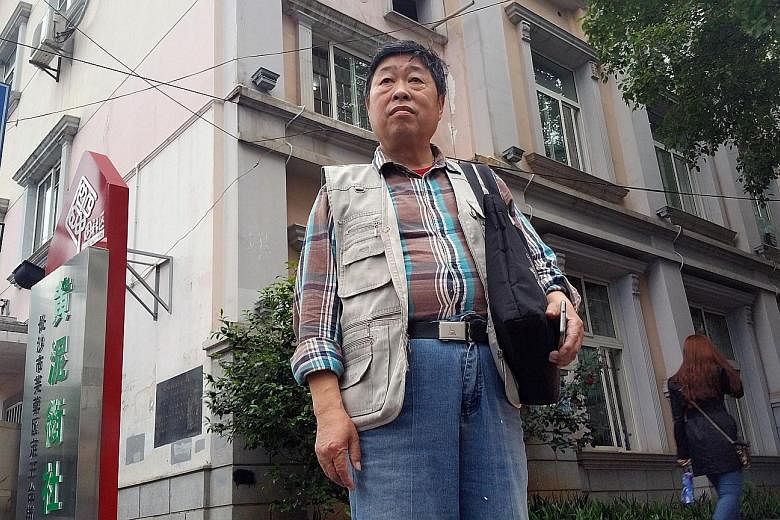The year was 1964. Mr Cheng Baoluo, then 19, thought he had his future all mapped out. He planned to go to university, become a mathematician and saw himself married by the time he was in his mid-20s.
A decade later, the Changsha native was no mathematician and had no wife - his life's plans dashed by the Cultural Revolution that Mao Zedong unleashed in 1966.
First, Mr Cheng's university application was rejected in 1964 because, he learnt, his father had friends in Taiwan, where the Kuomintang (KMT) had fled after losing the civil war against the communists in 1949.
With China in the grip of a "class war" and Mao determined to purge all those associated with the KMT - landlords, rich peasants and counter-revolutionaries - the Taiwan link proved a problem for the young man.
Still hoping to go to university, Mr Cheng thought he would stand a better chance if he volunteered to join the "send-down movement" that began in the 1950s and despatched high school graduates like him to the countryside to undergo re-education among the rural folk.
The "send-down movement" saw millions of zhishi qingnian, or educated youth, uprooted from the cities to rough it out in rural areas.
-
Timeline
-
MAY 16, 1966
The Chinese Communist Party under Mao Zedong launches the Cultural Revolution Group tasked with exposing and criticising the bourgeoisie in academia and the government. MAY 25 A lecturer posts the first dazi bao (big-character poster) at Peking University slamming school leaders, triggering a nationwide denunciation of intellectuals.
AUG 5
Mao launches attacks on State President Liu Shaoqi in a big- character poster entitled Bombard the Headquarters.
AUG 18
Mao, for the first time, meets more than one million Red Guards in Tiananmen Square.
AUG 19 The campaign to destroy the Four Olds - old customs, culture, habits and ideas - begins, with Red Guards storming private properties, burning books, destroying historical sites and beating up people.
JAN 28, 1967
Mao endorses a number of measures to rein in the power of Red Guards, but violence continues, leading up to armed suppression.
DEC 22, 1968
Mao starts the "Up to the mountain, down to the village" movement.
SEPT 13, 1971
Marshal Lin Biao, Mao's heir apparent, dies in an air crash in Mongolia.
JULY 17, 1974
Mao hits out at factionalism in the party, warning his wife Jiang Qing against forming a "Gang of Four" with her associates.
OCT 6, 1976
Less than a month after Mao's death, anti-Gang of Four leaders arrest all members of the clique in a bloodless coup, putting an end to a decade of political and social turmoil.
SOURCES: PEOPLE'S DAILY, XINHUA, MAO'S LAST REVOLUTION
Mr Cheng, who was sent to Jiangyong county, about 470km from Changsha, believed he would be allowed to further his studies after three years of "good behaviour".
But it was not long before he realised that Mao's class struggle made it almost impossible for zhishi qingnian, or zhiqing for short, to leave.
By the time Mr Cheng was able to return to Changsha - after feigning illness - he was almost 30. He got married six years later and worked in a chocolate factory before becoming his own boss.
If not for the Cultural Revolution, "I would have gone to university and become a mathematician," the 71-year-old tells The Straits Times.
COUNTING THE COST
Today, the cost of what is arguably the most tumultuous period in modern China's history is still being counted.
It began on May 16, 1966, when Mao alleged that "representatives of the bourgeoisie" had infiltrated all levels of the party and society, and must be removed through violent class struggle.
Soon, China was thrown into upheaval as children turned on their parents, pupils terrorised teachers, and the uneducated tyrannised the intelligentsia. Over the next decade and until after Mao's death in 1976, at least 1.5 million people are believed to have been killed.
As for the "send-down movement", it left ramifications that are still being felt today.
Before 1966, there were about 1.5 million zhiqing. Their numbers ballooned to 16.5 million eventually as Mao's fanatical Red Guards were also sent down, partly to curb their atrocities in the cities and also to fill the need for teachers.
For Mr Cheng, the influx made the already tough life of zhiqing worse as villagers turned hostile.
"When we first went down, the locals treated us well as they knew we were responding to Mao's call to be sent down. They viewed us as Mao's students," he says.
"But later, they began to view us with hostility. Some even said we were worse than the landowners."
Another Changsha native, Mr Xie Xiangjing, now 69, was sent down to Lingling county, also in 1964.
The fierce infighting among Red Guard factions, he says, nearly cost him his life. He was driving 26 other zhiqing to their workplace in 1967 when they were fired on by Red Guards, who mistook them for a rival group. Nine died. Mr Xie was among the injured, with nine gunshot wounds to his face and body.
Because of his injuries, Mr Xie was allowed to return to Changsha. He would later become a veterinarian, using the skills he had picked up in the village. He retired in 2007.
CHINA'S LOST GENERATION
Analysts say the Cultural Revolution had a significant impact on the millions of zhiqing, so much so they have been called China's lost generation.
For instance, many who had hoped to return to the city chose not to marry so they would not be tied down in the villages.
Those who married locals had to divorce their spouses in order to go back to the city or resign themselves to spending the rest of their lives in rural China.
Madam Mu Ruiyan, now 64, spent 47 years in south-western Yunnan province's Ruili bordertown after she was sent down from Beijing in May 1969. In 1972, she married a local man and they had three sons by the time the Cultural Revolution ended in 1976.
"My mother wanted me to divorce my husband so that I could return to Beijing. But what man would want a divorcee with three young children?"
The send-down experience also robbed many zhiqing of the chance to further their education. Only 1.15 million had a university education.
A doctor from Inner Mongolia who gave only his surname, Liu, says his career would have been more successful had he not been sent to a village, where he spent eight years as a "barefoot doctor".
Dr Liu, now 75, says: "When I retired, I was only an associate chief physician. These days, many doctors in their 30s are already chief physicians."
LASTING IMPACT
Former zhiqing Liu Xiaomeng, now a historian at the Chinese Academy of Social Sciences, says the send-down movement continues to impact China's development.
In denying bright young Chinese people the chance to further their studies, it also deprived the country of their talent - which remained untapped - and their potential contributions, Dr Liu says.
Their experiences of persecution and the emotional scars from being separated from their families have also coloured the views of zhiqing towards society, and influenced the way they raised the families.
Dr Liu says President Xi Jinping and Premier Li Keqiang are former zhiqing, whose send-down experiences may have shaped their policies and priorities.
"These leaders saw first-hand the ill effects of ultra-leftist ideology on the country, and also the hardships of the people at society's lowest levels, like the farmers," he says.
The send-down experiences would have had some degree of influence on the leaders, he adds.
However, those who had hoped for some form of redress, such as state support, when the new leadership took power in late 2012, say they have been disappointed after seeing a Maoist revival and clampdown on intellectuals and civil society under Mr Xi.
"The leaders may have the same experiences as us but they don't represent us," says Mr Cheng."The solution is not to expect more help or redress from the government. The key lies in shedding our zhiqing mindset so as to free us from the past."
• Additional reporting by Lina Miao in Beijing



